When Lieutenants Mirna Dirani and Tharwat Eskander, corps officers and outreach and evangelism directors at Mississauga Community Church, Ont., realized that the young adults in their corps were seeking something greater than just attending church, they set out to create a ministry that would blend discipleship with social justice education.
“Gen Z wants to take action and do something about the needs around them,” says Lieutenant Dirani. “So, we wanted to create a ministry that will pour into them spiritually, train them about different social justice issues and introduce them to street outreach.”
In partnership with the territorial modern slavery and human trafficking (MSHT) response committee, Lieutenants Dirani and Eskander created Others, an 18-month discipleship program that teaches young adults ages 18-30 about MSHT in their own communities and the world, and then equips them to be a voice for change. The program includes bi-weekly meetings that alternate between training sessions and street outreach to address the needs of vulnerable populations.
WHAT CAN WE DO?
Statistics Canada reveals that most reported trafficking incidents occur in major metropolitan areas, such as Toronto, Halifax, Montreal, Vancouver and Edmonton. Of the cases reported to law enforcement, 67 percent originate within Ontario, including the GreaterToronto Area (GTA), where the Others participants live, work, study and worship.
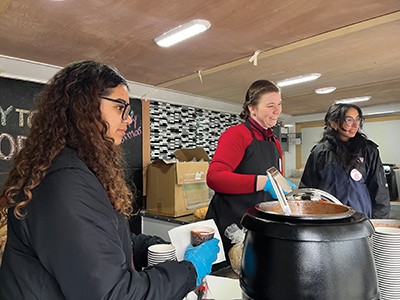
With its proximity to Toronto’s Pearson Airport, Highway 401 and the United States border, Mississauga has become a hub for trafficking activity. “It’s happening in mass numbers; however, it’s so subtle that you won’t know it is happening if you’re not aware of the signs,” explains Lieutenant Eskander. “Our hope is that through this program, and other outreach programs such as Brave, we can help equip people to share information with other young adults and churches, raising awareness of what is happening in our own backyard.”
Major Ray Lamont, territorial MSHT response co-ordinator, has stepped in to provide mentorship and education about MSHT, offering monthly training about what it is, the signs, how it connects to Scripture and what followers of Christ can do to combat it. She has come alongside participants to advise them, teach them about raising awareness and show them how to connect with people who have been affected by MSHT.
“We want participants to understand that trafficking happens right here in ourcommunity,” says Lieutenant Dirani. “By raising awareness, they can become agents of change in their schools and churches.”
MISSION IN MONTREAL
A core aspect of the Others ministry is relationship-building. The team visits homeless shelters and encampments not just to serve, but to connect with individuals on a personal level. “It’s about more than handing out coffee or pastries; it’s about showing people they have value,” says Lieutenant Eskander.
At one local shelter that participants have visited a few times, they have begun to learn names, share stories and follow up on the lives of the residents. “It’s understanding that people need more than just a sandwich or a coat,” Lieutenant Eskander continues. “They need friendships.”
In July 2024, the team travelled to Montreal where they had the opportunity to engage in hands-on outreach and evangelism as they visited high-risk areas and spoke with people on the streets.
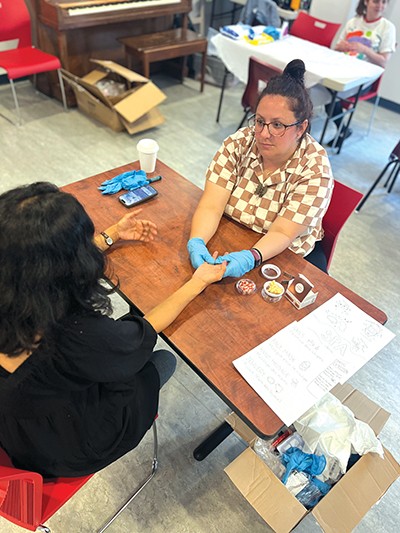
“We went to Montreal during the jazz festival, which usually attracts about 30,000 people. We tried to show them that outreach can be fun and creative,” explains Lieutenant Eskander. As part of their outreach efforts, the team set up a Wheel of Fortune-style game called “Wheel of Blessings” where people could spin a wheel and win fun prizes while learning about the Army’s mission and MSHT. One of the options on the wheel was a prayer, and Lieutenant Eskander was surprised by how many people asked for prayers, which team members provided on the spot.
“Some people stood and prayed for those who are victims of trafficking,” he says.
Another day, the female Others participants went into a shelter for women who had experienced abuse or were fleeing from abusive relationships, and provided them with a spa day. “I think it was a highlight for a lot of our young people,” says Lieutenant Eskander. “They were able to connect with people on a deeper level.”
Others also partnered with the local emergency disaster services team and went into one of the highest-risk areas in downtown Montreal, which has the highest rate of crime in the city. They put out a table with food, drinks and hygiene items, and shared them with individuals on the street. In partnership with a Telus Health mobile unit, they were also able to tend to medical needs such as open wounds.
Others plans to host a second mission trip in 2025, this time internationally.
ACCEPTING THE CHALLENGE
For many of the Others participants, street outreach is something that they have never done before. It means stepping out of their comfort zones, talking to and often praying with strangers, and becoming comfortable and confident in sharing their faith with people who are struggling. It blends personal and spiritual growth with social responsibility, and many participants leave the program witha renewed sense of purpose and a closer relationship with God.
“If you ask these young adults what they love about The Salvation Army, it’s the mission and how it started—on the streets. It started by helping vulnerable people and going into the city to find the lost,” says Lieutenant Dirani. “What speaks to young people in the Army is the social justice work. To them, mission is more than just Sunday morning worship. They have a passion and fire for Jesus, and now they’re putting it into action.”
Jessica Hanna participates in Others alongside her siblings, Fadi and Emily, and believes that this ministry has been an answer to prayer for her. “Back home [in the Middle East], it wasn’t a place where you could go outside on the streets and talk to people about God, and that was really challenging for Christians,” she explains. “But I’ve always prayed for God to give me boldness to be able to share his love and hope for others.”
When her family came to Canada, they met Lieutenants Dirani and Eskander who told them about the mission of The Salvation Army. When she heard about Others, she thought, Finally, God, this is my opportunity. “Seeing the darkness that other people get dragged into can be very hard, and trying to share the love of God through that darkness is even harder,” says Hanna. “But it all disappears when you know that we’re following Jesus’ steps.”
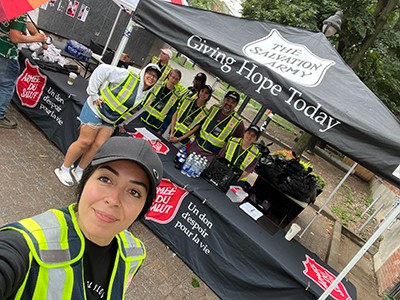
Kat Nadler says the mission trip to Montreal forced her to cast aside her own worry and anxieties to do God’s work, putting faith into action and sharing God’s message with the world. “One single week of complete sacrifice of myself, my thoughts and my desires—giving up everything I am for everything he needs me to be—was life changing,” says Nadler. “I’ve never felt so much of God’s love with me. After I returned home, I felt filled with the Holy Spirit.”
Nadler says Others has been a transformative experience, affecting her own life and spiritual development. Through it, she has realized that the most powerful testimony she can give to others is to grow her own personal relationship with Jesus. “The most important justice we can do is to spread the truth of the love and mercy of Jesus to the lost and deceived, to commit to partnering with the Holy Spirit to do all we can to help win souls back to Jesus where they belong.”
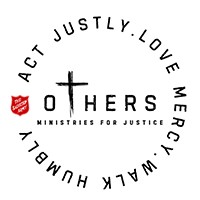
A GREATER MOVEMENT
The Others ministry continues to grow as its influence expands beyond Mississauga. The team has plans to engage other corps in the GTA, raising awareness of MSHT and training other Salvationists in outreach strategies. “Our vision is for these young adults to become the pioneers and pillars of this ministry,” Lieutenant Eskander explains.
With 17 participants currently enrolled, representing various cultural backgrounds and cities across the GTA, there is a sense of enthusiasm for spreading the message of hope and love in their communities. The program is not just about immediate outreach; it’s about equipping a new generation of leaders who will carry this mission forward.
“Their ministry doesn’t end here. We want to see them leading a ministry like this in their own corps and communities,” says Lieutenant Dirani, who has witnessed an uptick in young people asking how they can do something similar in their own spaces.
“Through Others, we can be there, extending hope to those who need it,” says Lieutenant Eskander.
RESOURCES
Step Up for Justice is a video series presented by The Salvation Army’s territorial modern slavery and human trafficking (MSHT) response committee, aimed at helping youth understand what MSHT is and how they can take action to protect themselves and their communities. The series, offered in both English and French, includes four videos and accompanying downloadable guides for school and community groups as well as church-based groups. Youth are encouraged to work through the series together, helping them feel empowered to create change and step up for justice.
Step Up and Pray is a 31-day collection of prayer resources for corps to pray for victims of MSHT and to pray for change in their communities and the world.
Learn more about the Step Up Movement at salvationist.ca/humantrafficking/step-up-movement-2025.
This story is from:




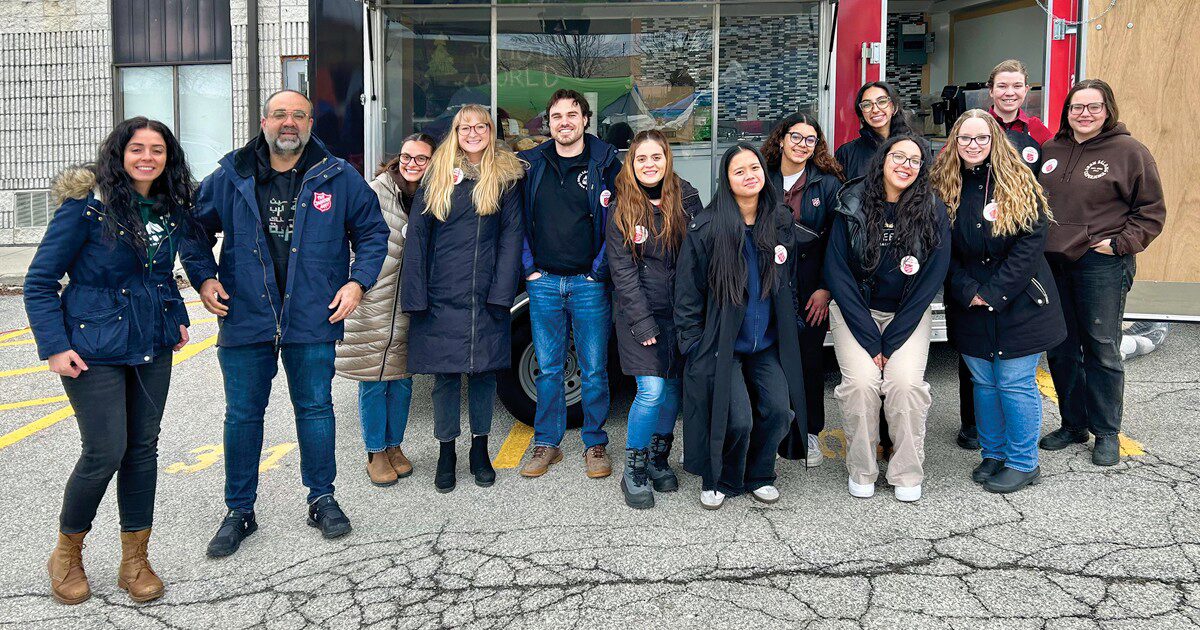





Leave a Comment